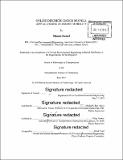Online discrete choice models : applications in smart mobility
Author(s)
Danaf, Mazen(Mazen Salah)
Download1129589503-MIT.pdf (16.99Mb)
Other Contributors
Massachusetts Institute of Technology. Department of Civil and Environmental Engineering.
Advisor
Moshe E. Ben-Akiva and Bilge Atasoy.
Terms of use
Metadata
Show full item recordAbstract
Discrete choice models have been widely applied in different fields to better understand behavior and forecast market shares. Because of their ability to capture taste heterogeneity, logit mixture models have gained increasing interest among researchers and practitioners. However, since the estimation of these models is computationally expensive, their applications have been limited to offline contexts. On the other hand, online applications (such as recommender systems) require users' preferences to be updated frequently and dynamically. The objective of this dissertation is to develop a methodology for estimating discrete choice models online, while accounting for inter- and intra-consumer heterogeneity. An offline-online framework is proposed to update individual-specific parameters after each choice using Bayesian estimation. The online estimator is computationally efficient, as it uses the data of the individual making the choice only in updating his/her individual preferences. Periodically, data from multiple individuals are pooled, and population parameters are updated offline. Online estimation allows for new and innovative applications of discrete choice models such as personalized recommendations, dynamic personalized pricing, and real-time individual forecasting. This methodology subsumes the utility-based advantages of discrete choice models and the personalization capabilities of common recommendation techniques by making use of all the available data including user-specific, item specific, and contextual variables. In order to enhance online learning, two extensions are proposed to the logit mixture model with inter- and intra-consumer heterogeneity. In the first extension, socio-demographic variables and contextual variables are used to model systematic inter- and intra-consumer taste heterogeneity respectively. In the second extension, a latent class model is used to allow for more flexibility in modeling the inter- and intra-consumer mixing distributions. Finally, the online estimation methodology is applied to Tripod, an app-based travel advisor that aims to incentivize and shift travelers' behavior towards more sustainable alternatives. Stated preferences data are collected in the Greater Boston Area and used to estimate the population parameters, which are then used by the app in online estimation. Using the collected data, a large number of synthetic users is simulated, and the recommendation system is tested over several days, and under different scenarios. The results show that the average hit-rate generally increases over time as we learn individual preferences and population parameters.
Description
Thesis: Ph. D. in Transportation, Massachusetts Institute of Technology, Department of Civil and Environmental Engineering, 2019 Cataloged from PDF version of thesis. Includes bibliographical references (pages 100-108).
Date issued
2019Department
Massachusetts Institute of Technology. Department of Civil and Environmental EngineeringPublisher
Massachusetts Institute of Technology
Keywords
Civil and Environmental Engineering.